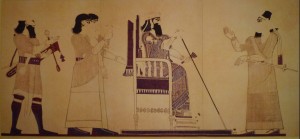by
Damien F. Mackey
King Hoshea of Israel was politically active during the reign of king Shalmaneser [V] of Assyria, whose kingdom the latter eventually destroyed. It would be fitting, then, that Tobit, the father of Tobias (= Job), who was taken into captivity by this same Shalmaneser, and who was from the northern kingdom of Israel (tribe of Naphtali), would once have served as a high official also for Hoshea.
Why?
Because Tobit himself tells us that he had been given a ‘roving commission’ by king “Shalmaneser” of Assyria, who “gave him leave to go whithersoever he would, with liberty to do whatever he had in mind” (Tobit 1:14, Douay version). In other words, Tobit was a great man of that time.
Now, given my argument that the name ‘Tobit’ is just a variant of the name, ‘Obadiah,
see post for Nov 2, 2009 at:
then Tobit becomes the standout candidate, I think, for the official of king Hoshea, ‘Abdi, who owned the king’s seal (see BAR 21:06, Nov/Dec 1995):
“The minister’s name inscribed on the seal is Abdi (‘BDY), or, to use his full name in English, Obadiah (again, the name of a prophet, but a different person)”.
See also post for May 1, 2012, at:
The name, ‘Obadiah, is the same as the name of Mohammed’s father, ‘Abdullah. For, according to wikipedia (article “Obadiah”) http://en.wikipedia.org/wiki/Obadiah
Obadiah is a Biblical theophorical name, meaning "servant of Yahweh" or "worshipper of Yahweh."[1] It is cognate to the Arabic name ‘Abdullah. The form of his name used in the Septuagint is Obdios; in Latin it is Abdias.
What adds further intrigue to all this is that Mohammed’s mother was Amina, whilst Tobit’s wife was Anna. So the parents of young Tobias were ‘Obadiah (= ‘Abdullah) and Anna, whilst those of Mohammed were ‘Abdullah and Amina.
Tobit is the standout for ‘Abdi, the high minister of king Hoshea of Israel.

